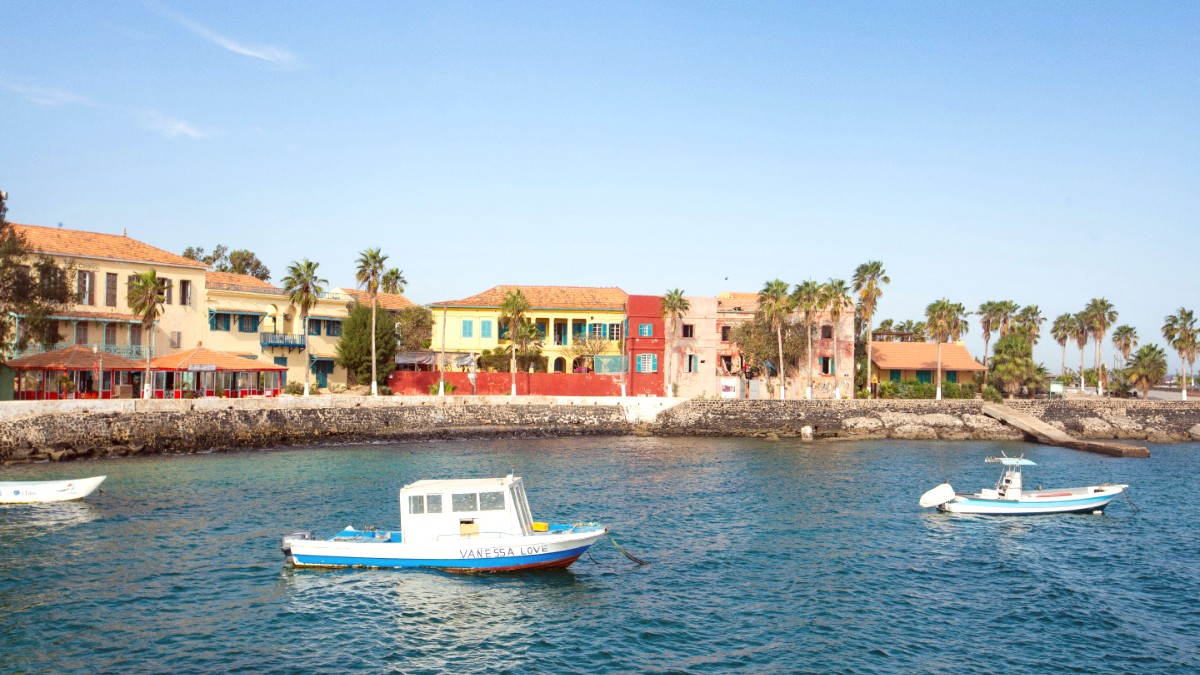
Senegal
Dry Season (November to June): This period generally features cooler and less humid conditions, making it the most popular time for visitors. Daytime temperatures range from 20°C to 25°C (68°F to 77°F). Nighttime temperatures dip slightly, especially from December to February. Humidity levels are low. Rainfall is minimal to non-existent during these months.
Harmattan Wind: From December to February, the Harmattan, a dry, dusty trade wind from the Sahara, can blow. This brings hazy conditions, reducing visibility and possibly causing respiratory discomfort for some individuals. The dust can cover surfaces and make the air feel thick.
Dakar does not experience monsoons or hurricanes. The main special weather consideration is the Harmattan wind, which can bring dust and haze from December to February.
During the rainy season, temperatures feel extremely hot and humid, and heavy downpours can cause temporary flooding in certain urban areas. Plan for these conditions, notably if you visit between July and October.
November to February
Most pleasant weather, mild temperatures, low humidity, ideal for sightseeing, clear skies.
Higher flight and accommodation prices, more crowded attractions.
March to June
Still dry and sunny, fewer tourists, potentially lower hotel/flight prices.
Temperatures steadily climb, becoming very hot towards June.
July to October
Lowest prices for accommodation and flights, lush green landscapes, minimal tourist crowds.
High heat and humidity, heavy rainfall and localized flooding, increased mosquito activity.
November to May (dry season) presents the most comfortable weather for walking tours, visiting landmarks, and enjoying outdoor markets.
November to May offers warm, sunny days ideal for swimming, sunbathing, and watersports.
Many major cultural festivals and events take place during the dry season.
The renowned Dak'Art Biennale's timing varies; check specific festival dates.
Favorable weather attempts to attract more attendees to events.
Confirm specific festival dates before making your travel arrangements.
Regulations vary by nationality, so checking the specific rules that apply to you is important. Confirm your passport and any needed documentation meet the specified criteria to avoid issues upon arrival.
Citizens of most ECOWAS countries, the European Union, United States, Canada, United Kingdom, and many others, generally do not require a visa for stays up to 90 days. This makes short visits straightforward for a large number of international travelers.
Regardless of visa requirements, all travelers need certain documents:
For most standard tourism activities in Dakar and Senegal, no special permits are needed. However, certain specific activities might call for them:
Costs vary significantly based on your travel style, from budget-conscious backpacking to luxury experiences.
Currency: The official currency of Senegal is the West African CFA Franc (XOF). This currency is used by several countries in the West African Economic and Monetary Union (UEMOA).
Exchange Rate: The XOF is pegged to the Euro at a fixed rate: 1 Euro (€) equals 655.957 XOF. This fixed rate brings stability and simplifies calculations if you are familiar with Euro values. Check current exchange rates for your home currency against the Euro or CFA Franc before you travel.
Daily Costs: XOF 20,000 - XOF 40,000 (approx. $35 - $70 USD)
Hostel dorms, street food, local transport, free attractions.
Limited comfort, less variety in dining/activities.
Daily Costs: XOF 50,000 - XOF 100,000 (approx. $85 - $175 USD)
Mid-range hotels/Airbnbs, mix of local/international dining, ride-sharing, museum entry.
Higher costs than budget, still some reliance on local transport.
Daily Costs: XOF 120,000+ (approx. $200+ USD) per day
High-end hotels, fine dining, private drivers, specialized tours.
Highest travel expenditures.
| Category | Low End (XOF) | High End (XOF) |
|---|---|---|
| Accommodation (per night) | 10,000 (hostel) | 100,000+ (luxury hotel) |
| Meals (per person) | 500 (street food) | 50,000+ (fine dining) |
| Local Transport (single ride) | 200 (bus) | 5,000 (taxi, negotiate) |
While generally a welcoming city, awareness of common health concerns, local crime patterns, and emergency procedures helps you travel with peace of mind. Taking preventative measures and knowing how to respond to unforeseen circumstances is important.
A certificate is for travelers aged 9 months+ from/transiting through risk countries. Entry may be denied without it.
Recommended for all travelers, especially if contact with bodily fluids or local medical treatment.
Consider for most travelers. Rabies for long-term or animal-related activities.
Malaria Risk is High Year-Round.
Prevention: Take prescribed anti-malarial medication. Use Insect repellent with DEET (20-30%) or picaridin. Sleep under an insecticide-Treated mosquito net if windows are unscreened or no AC. Wear long sleeves and long pants, especially at dawn and dusk.
Dengue Fever, Chikungunya, and Zika Virus also appear.
Traveler's Diarrhea: Common. Practice strict food and water hygiene. Use only Bottled water, boiled water, or water purified with a LifeStraw Personal Water Filter or purification tablets. Avoid ice cubes, unpasteurized dairy, unpeeled fruits/vegetables unless washed with safe water. Eat hot, freshly cooked food. Carry Anti-diarrhea medication (e.g., Imodium) and oral rehydration salts.
Heatstroke/Dehydration: Drink plenty of bottled water. Wear lightweight, loose-fitting clothing. Seek shade during hottest parts of the day.
Dakar has good private clinics (Clinique de la Madeleine, Hôpital Principal). They often require upfront payment. Medical evacuation to Europe may be needed for serious conditions.
Ambulances are available but may not be as prompt or well-equipped as in Western countries. Response times vary.
Tap water in Dakar is not safe for drinking. Use bottled water for drinking and brushing teeth. Confirm bottle seals are intact. Consider water purification methods.
Dakar is generally safe for tourists, but petty crime is prevalent, as in any large city. Be aware of your surroundings.
These resources can support your health and safety planning:
For water purification: LifeStraw
For medical supplies: Adventure Medical Kits
For travel security: Pacsafe